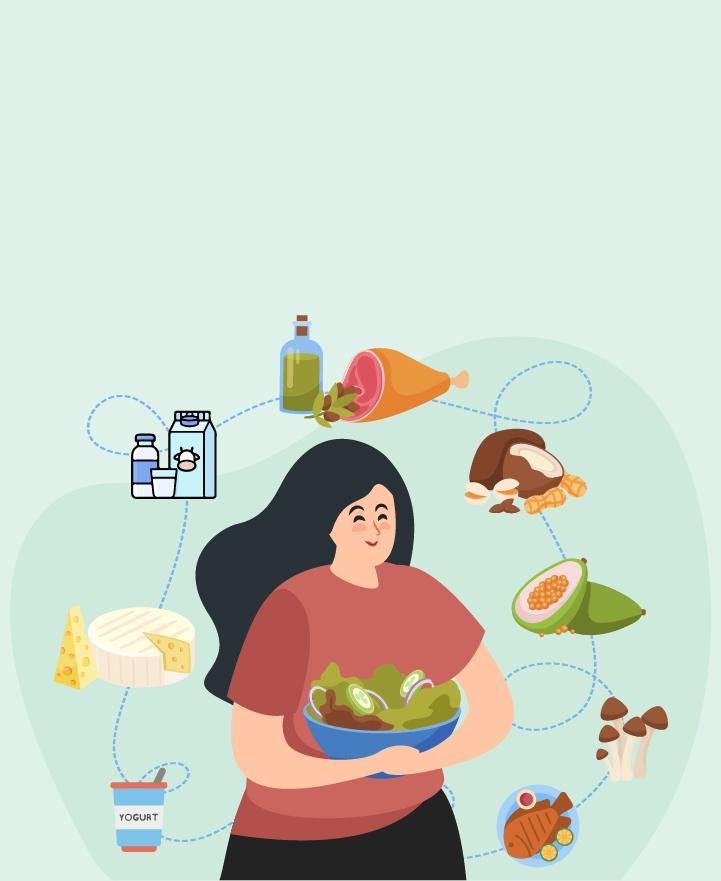

Can Your Diet Relieve PCOS Symptoms?
PCOS, or Polycystic Ovary Syndrome, is probably the most common health issue faced by women all across the world. One of the key symptom of this condition is experiencing irregular periods. Following a balanced diet can help manage PCOS symptoms better. Read on to learn about polycystic ovary syndrome diet.
Can Diet Ease the Effects of PCOS?
Yes, diet can help alleviate symptoms of PCOS. Women with PCOS find it difficult to manage their insulin level because their bodies resist the process of insulin build-up. By following a balanced diet focussed on low-glycemic index foods, it can improve insulin sensitivity and successfully manage the insulin level of their body.
Healthy eating is the foundation of good health. No matter what type of treatment you are getting, if you don’t follow a prescribed diet, you might not be able to leverage the results of your treatment. This is why following a polycystic ovary syndrome diet plan is essential to help tackle its symptoms.
Foods To Avoid
There are some foods to avoid with PCOS. It’s generally recommended to limit or avoid the following types of foods:
1. Sugar foods and beverages such as sodas, candies, pastries or any such item that can cause spike in blood sugar and insulin levels.
2. Refined carbohydrates such as white rice, white bread, and pasta made from refined flour.
3. Processed foods like fast foods, packaged snacks, and processed meals as they often contain unhealthy fats and added sugars.
4. Full-fat dairy products can some time aggravate PCOS symptoms. Opt for low-fat or plant-based alternatives.
5. Fried foods, baked goods, and some margarines as they contain trans fats that can contribute to inflammation & insulin resistance.
Foods to Eat
So, what foods to eat with PCOS? Focusing on whole, nutrient-dense foods can help manage PCOS symptoms effectively. Incorporating following types of foods into your diet can be beneficial:
1. Lean proteins such as chicken, turkey, fish, tofu, and legumes can help stabilize blood sugar levels.
2. Brown rice, quinoa, oatmeal, and other whole-wheat products is a good addition as they provide fibers and help manage insulin levels.
3. Non-starchy vegetables like leafy greens, broccoli, & bell peppers are nutritious and rich in fiber.
4. In fruits, one can opt for berries, apples, and pears as they are lower in sugar as compared to other fruits and are also high in fiber and antioxidants.
5. Healthy fats from avocados, nuts, seeds, and olive oil can help reduce inflammation and & improve insulin sensitivity.
6. Legumes like beans, lentils and chickpeas aids in blood sugar control as they are high in fiber and protein.
Conclusion
You may experience a surge of frustration if you have been diagnosed with PCOS. It takes stamina, willpower, and consistency to deal with this. However, if you are determined to defeat this health issue, you must adhere to a healthy lifestyle. Don’t forget to go for regular check-ups and stick to your diet plan to reduce the effects of PCOS.
One of the important components of our overall wellness is also being financially secured. Healthcare emergencies can happen any time, but a good health insurance policy can protect you from such uncertain situations. To know more about Wellness and other health related tips, visit the wellness corner.
Source: medicalnewstoday.com, healthline.com, lancastergeneralhealth.org
Disclaimer: This blog provides general information and discussions about health and related subjects. The information and other content provided in this blog, website or in any linked materials are not intended and should not be considered, or used as a substitute for, medical advice, diagnosis or treatment. Kindly contact your Doctor before starting a new medicine or health regime.
Related Articles
Polycystic Ovary Syndrome: Foods to Eat & Avoid
PCOS vs PCOD: Understanding the Differences
Does PCOS/PCOD Impact Fertility?
Understanding PCOD: Causes and Management
Why Is My Period Late? 8 Reasons Besides Pregnancy
Published on August 13, 2024














 Health Insurance
Health Insurance  Travel Insurance
Travel Insurance  Car Insurance
Car Insurance  Cyber Insurance
Cyber Insurance  Critical Illness Insurance
Critical Illness Insurance
 Pet Insurance
Pet Insurance
 Bike/Two Wheeler Insurance
Bike/Two Wheeler Insurance  Home Insurance
Home Insurance  Third Party Vehicle Ins.
Third Party Vehicle Ins.  Tractor Insurance
Tractor Insurance  Goods Carrying Vehicle Ins.
Goods Carrying Vehicle Ins.  Passenger Carrying Vehicle Ins.
Passenger Carrying Vehicle Ins.  Compulsory Personal Accident Insurance
Compulsory Personal Accident Insurance  Travel Insurance
Travel Insurance  Rural
Rural